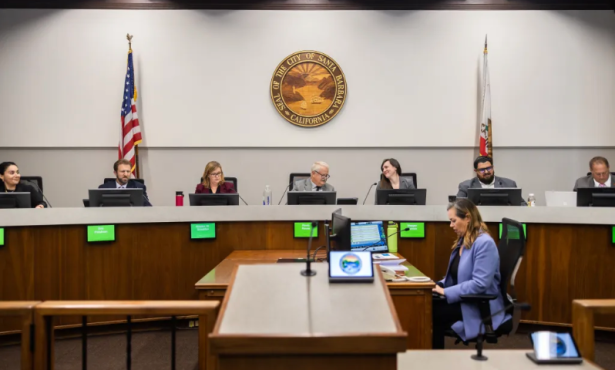Propositions
2010 Election Endorsements
As a general rule, The Santa Barbara Independent has come to regard any and all statewide ballot measures as guilty until proven innocent: guilty of unintended consequences; guilty of being wolves in sheep’s clothing; guilty of being unnecessary; and guilty of messing things up for no good reason. For the paper to endorse any proposition, we must be convinced that the measure is necessary and will do only what it says it will do. As a result, we are only supporting one of this June’s ballot measures.
Prop. 13: Yes
Property Tax Exemption on Seismic Retrofits
Currently, state law exempts earthquake upgrades from property tax assessments. This eliminates a possible disincentive for property owners wanting to make a necessary safety improvement. Prop. 13 would extend this practice and policy indefinitely. (If voted down, the policy will continue for another 15 years, but then be phased out.) It’s worth noting that this measure was unanimously endorsed by both houses of the State Legislature and that no group or individuals are campaigning against it.
Prop. 14: No
Top Two Vote-Getters ‘Open’ Primary
Given how vehemently the Democratic and Republican parties have come out against Prop. 14, we’re sorry to report that we can’t support it. At a time when California needs a head-to-toe tourniquet, Prop. 14 is only a Band-Aid. While it might do some good — should it survive the inevitable court challenges — it doesn’t come close to addressing the root problems generating Sacramento’s systemic dysfunction.
Prop. 14 was placed on the ballot at the insistence of State Senator Abel Maldonado — a rare Republican moderate — who demanded it as a concession for his deadlock-breaking vote in support of last year’s budget. Maldonado’s solution to legislative gridlock is to change the way elections are held. He dreams that Prop. 14 will help elect moderate candidates, more in touch with mainstream voters rather than the partisan extremists who’ve flourished by appealing to both parties’ activist bases. And it is these activist bases who wield the most influence in the primaries.
Under Prop. 14, members of any party can vote for any candidate of their choice during a primary, regardless of that candidate’s party. The top two vote-getters — again, regardless of party affiliation — would then face off in the general election. Independent or third-party candidates who didn’t make the final cut would not make it on the general election ballot, as they would under the existing system. It would also be possible for candidates of the same party to face one another in the general election. And it would be up to the candidates themselves to decide whether to identify their party affiliation to voters.
Proponents point out that every year more and more voters leave the traditional two parties. Because of this, the current system effectively disenfranchises a perilously large number of voters by preventing them from casting their ballots when it counts the most — in primary elections.
Maybe Prop. 14 would usher in a new era of reasoned moderation, but similar systems in other states have proved inconclusive. Our chief quarrel with Prop. 14, however, is that it will not solve any of the four most disruptive aspects obstacles to sensible legislation in Sacramento: (1) to pass a budget or levy a new tax a two-thirds majority vote is required; (2) the outrageous gerrymandering of voting districts all but guarantees the reelection of incumbents; (3) term limits, the result of a proposition intended to rectify incumbent invincibility, has instead turned the Legislature into a revolving door where no one can establish the collegial relationships essential for political compromise; (4) lastly, the initiative process itself — designed to empower voters to counter the might of “special interests” — has largely become a tool for, of, and by the special interests. The passage of Prop. 14 in the absence of these more meaningful reforms will accomplish little, if anything.
Prop 15: No
Allows Public Financing for Candidates, Secretary of State
In a highly theoretical universe, Prop. 15 would be recognized as a positive step forward. Unfortunately, that is not the universe in which most voters, politicians, and campaign donors dwell. If passed, Prop. 15 would tax state lobbyists, raising $6 million to be used in Secretary of State races for candidates who have accepted voluntary campaign limits. Instead, using less than half that amount, the state should pioneer meaningful improvements in reporting campaign donations and figure out better ways to disseminate that information to the public. At least that way, voters might be better informed about which special interests are backing which candidates and pick their poisons accordingly. The fine print of Prop. 15 stipulates that it would apply for only two election cycles. Presumably, in that time we will have figured out something better.
Prop 16: No
Two-thirds Vote Requirement for Local Providers
If truth in advertising laws had any teeth, this initiative would be renamed the Monopoly Protection Act, brought to you by — and for the benefit of — PG&E, which to date has spent $30 million trying to persuade voters to endorse a measure that runs counter to their own best interests. If approved, Prop. 16 would require local governments to get approval from two-thirds of the electorate before attempting to contract with any electricity providers other than big investor-owned utilities, like PG&E. Currently, many local governments are exploring arrangements — known as Community Choice — that supplement the energy they purchase from big utility companies with other supplies. So far, only one municipality has actually done so. Community Choice is seen by alternative energy advocates as a promising strategy by which California can increase its reliance upon non-fossil fuel energy sources. Big utilities, like PG&E, bristle at being required to share their transmission lines with these new providers. And they recoil at the prospect of actual competition, however limited. To discourage such competitors from ever materializing, PG&E has conjured this legislative hat trick, which they’ve presented as a taxpayer protection plan. Two-thirds majorities are notoriously difficult to achieve under even the most harmonious of circumstances. In the face of any controversy, they’re all but impossible. And that, of course, is the entire point.
Prop 17: No
Auto Insurance Continuous Policy Driver Rate Change
Yes, Virginia, there really is a Santa Claus. Mercury Insurance, we are led to believe, is spending $10 million to persuade the voters of Prop. 17’s virtues so it can charge auto insurance customers on average $250 a year less. Mercury claims it’s attempting to amend a voter initiative passed in 1988 so that auto insurance customers with good driving records and continuous coverage can claim a continuous-coverage discount. The language of that 1988 initiative, passed to regulate auto insurance rates, did not authorize continuous coverage discounts for customers changing policies. Prop. 17 would make that permissible, but not required. Consumer advocates and the State Insurance Commissioner have expressed concern that Mercury would make up the difference by charging higher rates to customers — even those with good driving records — who’ve let their insurance lapse for 91 days anytime in the past five years. They point out that many in the armed services have such lapsed coverage. Maybe if Mercury hadn’t been fined $500,000 recently for overcharging practices, we might be less dubious about their purported altruism. But really, when was the last time an insurance company spent millions so they could charge customers less?



